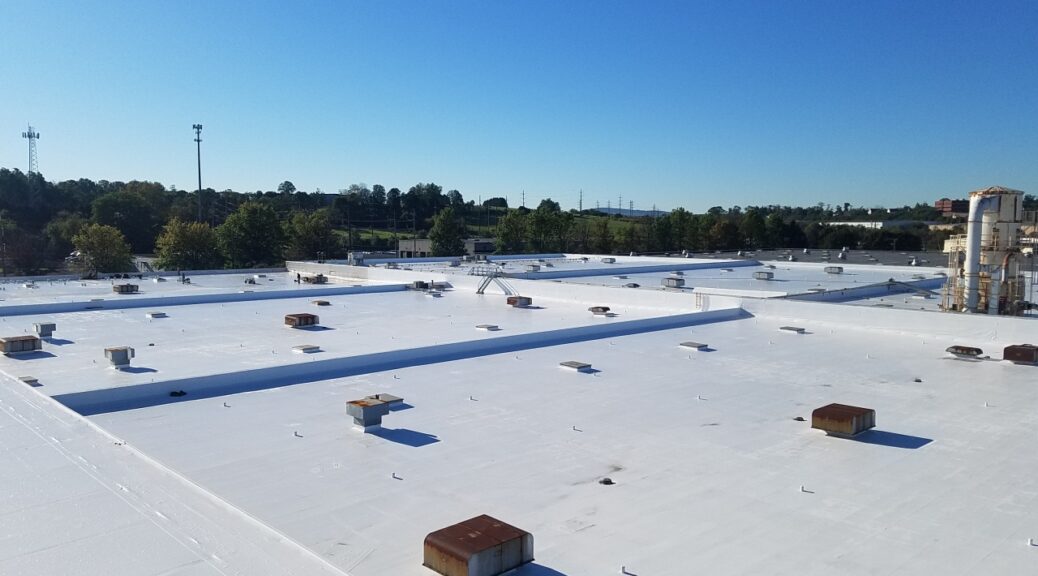Does your commercial roof occasionally leak? Even minor leaks can have detrimental impacts on your business and lead to mold, insect infestation, and product or machinery damage. You may worry that a total roof replacement is your only option to address this issue, so you’ve been putting off calling a commercial roofing contractor.
However, depending on the type and age of your roof, a commercial roof coating may be an easier and more economical solution.
Here at Heidler Roofing, we understand that our customers want the best roofing system for their commercial buildings. They want a leak-free roof, so they can stop worrying about roof issues and instead concentrate on running their business efficiently.
For over 60 years, we have been helping commercial building owners like you end their frustration with leaking roofs, material warping, and seam gaps. Our highly trained professional roofers can apply elastomeric roof coatings, like acrylic, silicone, polyurethane, and butyl.
1. What Is the Main Reason to Choose Elastomeric Roof Coatings?
The main reason to choose elastomeric roof coatings is that they can stop leaks, add energy savings, and revitalize your roof without tearing off the existing roof and replacing it. Elastomeric roof coating solutions often cause some tension in the roofing industry, as there is disagreement on what materials can be classified as elastomeric.
Acrylic roof coatings were one of the first materials used in commercial roof coatings, so some roofing professionals use acrylic and elastomeric interchangeably, even though technically, there are other different types of elastomeric roof coatings, like silicone and butyl.
2. What Are the Different Types of Roof Coatings?
There are many types of roof coatings, but here at Heider Roofing, we use three specific polymers that work best on commercial roofs:
Acrylic Roof Coating
Acrylic Roof Coating
Pros
- It can be used over asphalt, modified bitumen, or metal roofs
- Highly durable and can maintain its aesthetic for many years
- Highly reflective, so building owners can frequently save money on cooling their property in the summertime
- One of the more cost-effective roof coatings
Cons
- Requires primer, fabric reinforcement, and two coats of material to offer the same level of protection as other coating solutions
- It must be applied when temperatures are over 50°F
- It can be hard to see ice, snow, or moisture, so use caution when walking on a roof in the winter or with morning dew
Best For
- Ideal for rooftops that are structurally sound with occasional minor leaks
Silicone Roof Coating
Pros
- It reflects UV rays, so building owners may save money on cooling their building in the summer
- Protects against rust and corrosion
- A single coating of the material is often all that’s needed
- Resistant to ponding water
Cons
- Not suitable for roofs that need substantial repair
- Slippery when wet, so caution must be used after precipitation when walking on the surface
- It easily attracts dirt and other dust particles
Best For
- Suitable for metal and asphalt roof restoration
- Ideal for roofs that are structurally sound with occasional minor leaks
Butyl Roof Coating
Pros
- Solvent-based
- Excellent expansion and contraction properties
- High tensile strength
- Excellent reflectivity
- Exceptional performance as a vapor barrier
Cons
- Low solids content, so it takes more liquid material to achieve the same dry mil thickness of other roof coating solutions
- The color made fade over time
Best For
- Ideal for commercial cold-storage facilities with flat roofs
- It can be used on metal roofs, modified bitumen, built-up roofing, and single-ply roofing
3. How Can Silicone Roof Coating Benefit Your Building?
Due to elongation properties, a silicone coating is a popular commercial roof coating, and it can stretch about 200-250% without breaking. It is also highly reflective of UV rays to provide energy savings to building owners with this type of coating. This roof coating is also easy to apply and usually only requires a single coat for excellent protection of your roof system.
4. What Is the Difference Between Elastomeric and Silicone?
As we noted earlier, some roofers use the term elastomeric when referring to acrylic. Since silicone is an elastomeric polymer, we will answer the difference between acrylic and silicone roof coating solutions. Acrylic is a water-based material, whereas silicone is solvent-based.
This chemical basis makes a difference in your commercial roof coating because silicone is less temperature-sensitive. There are more available opportunities to apply this coating to your roofing substrate than acrylic coatings, which require specific weather conditions for application.
5. Which Commercial Roof Coating Is Best for My Building?
Many factors determine the best commercial roof coating solution for your building. Things like age and condition of the existing roof, type of roofing substrate, weather and temperature patterns for your area, cost, and even the type of business you conduct in your building can all affect the coating system you should get.
That’s why it’s best to leave it to professionals, like Heidler Roofing. With our roof inspections, we use a comprehensive inspection process to document everything we see. Your professional roofer will then provide you with recommendations for suitable commercial roof coating for your business. We also offer a roofing estimate to help you budget for any upcoming coating, maintenance, or repairs your roof may need.
Contact us today to get a roofing estimate and find out why business owners like you trust Heidler Roofing for their roof installation, restoration, and maintenance needs!


